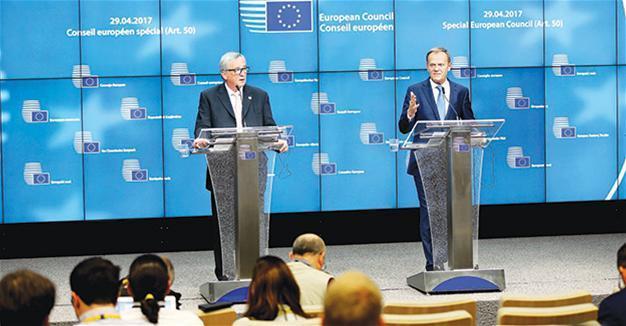EU imposes no preconditions before Turkey-EU meet in Brussels
Serkan Demirtaş - ANKARA

The European Union has not imposed any preconditions on Ankara, such as the lifting of the state of emergency, before a prospective meeting between top Turkish and European officials later in May, Turkish diplomatic sources have said, emphasizing Ankara’s interest in keeping channels of dialogue open with Brussels.
“We have not been notified about any preconditions with regard to our president’s planned meeting with EU officials. Although this meeting has not been confirmed, we are in favor of continuing our dialogue with the EU,” a Turkish official told the Hürriyet Daily News on May 3.
The official referred to a potential summit between President Recep Tayyip Erdoğan and the EU’s two top leaders, EU Commission President Jean-Claude Juncker and EU Council President Donald Tusk, on May 25 in Brussels, immediately after a NATO summit.
In a strongly worded criticism against the EU on May 2, Erdoğan cited a five-article list of demands from the EU that called on Turkey to lift its state of emergency, although it was not initially clear if these were submitted as fresh preconditions for the upcoming meeting.
The official said Ankara had not received any preconditions in regards to the meeting, emphasizing that no meeting between the two would be possible if the EU imposes conditions.
“The issue of lifting the state of emergency has nothing to do with the upcoming meetings,” the official said.
Turkey has been under a state of emergency since an attempted coup in July 2016, ostensibly to fight members of the Fethullahist Terror Organization (FETÖ), which has been accused of leading the coup, and to remove them from the state institutions. Although the EU acknowledged Turkey’s right to declare a state of emergency, it has strongly urged the government not to use the authority to crack down on dissident groups.
Turkey demands new road map
Turkish diplomatic sources likened the upcoming Erdoğan-Juncker-Tusk meeting to the process that was launched between Ankara and Brussels after Erdoğan’s October 2015 visit to Brussels which resulted in a comprehensive agreement in March 2016 on stemming the flow of irregular migrants to Europe via Turkey.
“The problems in the Turkey-EU relationship and the positions of both sides will be discussed in detail. Within the new framework to be reached at the meeting, the two sides will be able to conduct technical and political talks whose outcomes might be well discussed at a comprehensive Turkey-EU leaders’ summit at the end of this year,” the official said.
Turkey has long pressed for a high-level summit with the EU, but recent tension between Ankara and a number of EU countries, as well as elections in France and Germany, has resulted in the meeting being postponed until the end of 2017.
EU has three focal points
The EU, on the other hand, discussed the future of ties with Turkey at a Gymnich meeting in Malta last weekend with an eye to continuing its engagement with Ankara without its accession portfolio. Big powers in the EU, such as France and Germany, have suggested a new perspective on ties with the EU, while Austria and some other countries have demanded an official suspension of negotiations.
The EU and Turkey could discuss the continuation of the implementation of the migrant deal, cooperation in the field of counter-terrorism as well as upgrading the customs union.
Turkey, however, continues to demand the complete fulfillment of the migrant deal, which promises visa liberalization to Turkish nationals, the opening of five chapters and the provision of 6 billion euros by 2018 to reduce the burden of refugees on Turkey.
Opening chapters not possible
Although Erdoğan emphasized Turkey’s demand that chapters will be opened to continue the relationship with the EU, the current state of the accession talks suggests that no chapters will be opened. Almost all chapters that Turkey could hope to open are currently blocked by Greek Cyprus and the EU Commission due to Ankara’s refusal to extend the customs union to Greek Cyprus. At the same time, EU leaders have unofficially agreed that no chapters will be opened under the current state of democracy in Turkey.
Kati Piri, the European Parliament rapporteur on Turkey, told Germany’s daily Die Welt that opening new chapters was out of question for Turkey. “If Turkey is really interested in accession, it is necessary for Ankara to show it,” she told.
“If they are willing to enter the EU, they are obliged to meet the criteria. However, I absolutely don’t see this in Turkey. That’s why it is necessary for the talks to be suspended,” she said.
 The European Union has not imposed any preconditions on Ankara, such as the lifting of the state of emergency, before a prospective meeting between top Turkish and European officials later in May, Turkish diplomatic sources have said, emphasizing Ankara’s interest in keeping channels of dialogue open with Brussels.
The European Union has not imposed any preconditions on Ankara, such as the lifting of the state of emergency, before a prospective meeting between top Turkish and European officials later in May, Turkish diplomatic sources have said, emphasizing Ankara’s interest in keeping channels of dialogue open with Brussels.